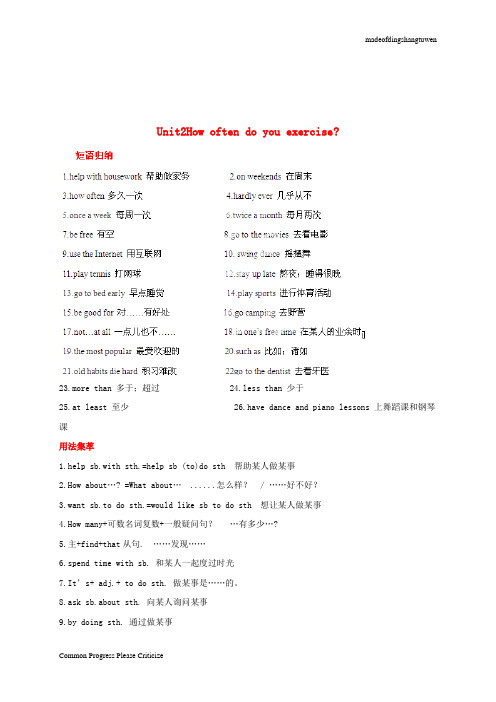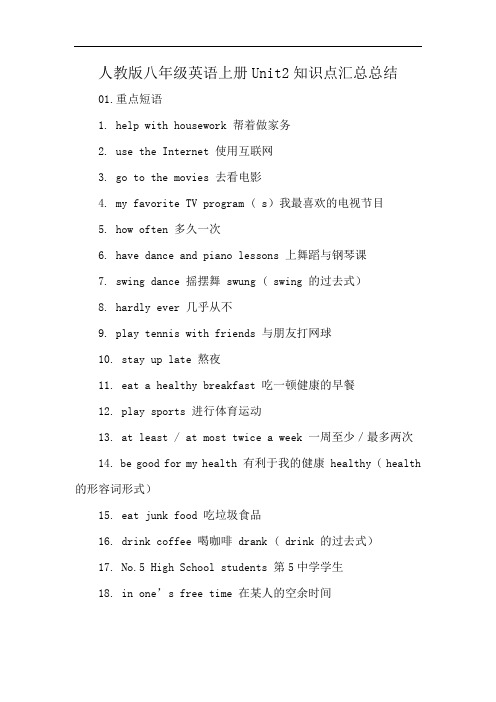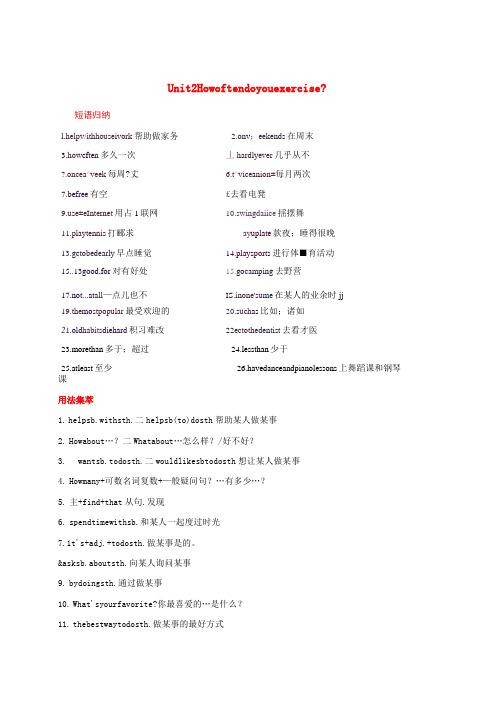人教版英语八年级上册Unit2知识点总结与训练
人教版八年级上册英语unit2重难点知识点梳理扩展

人教版八年级上册unit2知识点梳理及拓展CONTENT本讲课程内容:八上《新目标》Unit 2 How often do you exercise?Part 1 vocabulary 高频单词短语Part 2 grammar 语法要点Part 3 exercise 真题训练Unit 2 How often do you exercise?Part 1 vocabulary高频单词短语1. Next week is quite full for me.●---Do you need some more cakes? ---No, thanks, I am full. 吃饱的●I really had a full week so I don’t want to go out today.忙碌的●He has been studying in the new school for a full year. 完整的,整个的●The glass is full of water.装满的词组积累:●full marks满分●live a full life过着充实的生活●be full of 充满2. She says it’s good for my health.●keep / be in good health 健康状况好●keep / be in bad / poor health 健康状况不好●keep healthy/ fit 保持健康● a healthy lifestyle健康的生活方式3. Here are the results.●His illness is the result of a car accident …的结果(后加原因)●He made one big mistake, and as a result, lost his job. 作为结果4. We think the best way to relax is through exercise.●prep.We got the news through him. 通过;以,凭借I tried to call you but I couldn't get through. (电话)接通He will not live through the night. 在整个期间,自始至终I didn’t get through the exams. 通过●adj.Are you through with the computer yet ? 完成(某事);用完(某物)I’m through with you ! 与(某人)关系完结5. and you can spend time with your friends and family as you play together.●conj.She doesn’t sing as well as her sister. 和…一样When in Rome,do as Romans do. 按照…的方式;如同As my mother isn’t at home,we have to eat out. 由于;因为As time goes on, we'll grow up. 随着;当…的时候众所周知as everyone knows / as far as we know●prep.Dad dressed up as Santa Claus. 作为5. Old habits die hard.●1)死;死亡The man died young, at the age of 27.死于die of hunger/cancer/illnessdie from an earthquake/ an accident●2)消亡;消失Our love will never die. 我们的爱始终不渝。
人教版英语八年级上册Unit2知识点总结与训练

Unit2How often do you exercise?23.more than 多于;超过 24.less than 少于25.at least 至少 26.have dance and piano lessons 上舞蹈课和钢琴课用法集萃1.help sb.with sth.=help sb (to)do sth 帮助某人做某事2.How about…? =What about… ......怎么样? / ……好不好?3.want sb.to do sth.=would like sb to do sth 想让某人做某事4.How many+可数名词复数+一般疑问句?…有多少…?5.主+find+that从句. ……发现……6.spend time with sb. 和某人一起度过时光7.It’s+ adj.+ to do sth. 做某事是……的。
8.ask sb.about sth. 向某人询问某事9.by doing sth. 通过做某事10.What’s your favorite……? 你最喜爱的…是什么?11.the best way to do sth. 做某事的最好方式12.(1).不确定的频度副词:表示动作发生间隔(既频率)的副词。
它们有:always ; usually ; often ; sometimes ; seldom ; hardly ever ; never 等。
always(100%)> usually(约80%~90%)> often(约60%)> sometimes(约30%)> seldom(约20%)> hardly ever(约10%)> never(0%)在句中位置: 频度副词在句中通常放在be动词、助动词、情态动词之后, 在实义动词之前。
She is often late for school./I can never be sure./He always helps me.(2).表示确定的频率短语every day/week/month/year 每天/周/月/年;once a week 每周一次 ; twice a week 每周两次; twice a month 一月两次;three times a day 一天三次。
人教版八年级英语上册Unit2知识点汇总总结

人教版八年级英语上册Unit2知识点汇总总结01.重点短语1. help with housework 帮着做家务2. use the Internet 使用互联网3. go to the movies 去看电影4. my favorite TV program ( s)我最喜欢的电视节目5. how often 多久一次6. have dance and piano lessons 上舞蹈与钢琴课7. swing dance 摇摆舞 swung ( swing 的过去式)8. hardly ever 几乎从不9. play tennis with friends 与朋友打网球10. stay up late 熬夜11. eat a healthy breakfast 吃一顿健康的早餐12. play sports 进行体育运动13. at least / at most twice a week 一周至少/最多两次14. be good for my health 有利于我的健康 healthy ( health 的形容词形式)15. eat junk food 吃垃圾食品16. drink coffee 喝咖啡 drank ( drink 的过去式)17. No.5 High School students 第5中学学生18. in one’s free time 在某人的空余时间19. ask them about their free time activities 询问他们关于他们的业余活动20. not … at all 根本不…21. go online 上网22. be surprised that ..感到惊讶23. use it for fun 为了取乐而使用它24. the answers to the questions 这些问题的答案25. one to three times a week 一周一到三次26. two percent of the students 2%的学生27. the best way to do sth.做某事的最好方式28. such as 例如29. spend time with your friends 与你的朋友共度时光spent ( spend 的过去式)30. spend time on sth./ in doing sth.花时间在某事上/做某事31. play together 一起玩32. watch TV for over 2 hours 看两个多小时电视33. go to the dentist 去看牙医34. a 16-year-old high school student 一名16岁的中学生35. have a lot of good habits 有许多好习惯36. more / less than two hours 多/少于两小时37. go to the dentist for teeth cleaning 去牙医处清洁牙齿38. go to the shopping center 去购物中心02.重点句子语法聚焦1. --What do you usually do on weekends?你在周末通常做什么?--I always exercise.我总是锻炼。
人教版八年级上册英语unit2知识点及习题

人教版八年级上册英语unit2知识点及习题XXX the words "sometimes" and "XXX"。
"XXX。
while "sometime" means at some point in time。
For example。
in Unit 2 of our textbook。
we learn how often we exercise。
We can use phrases like "hardly ever"。
which means almost never。
or "once a week"。
which means once every seven days。
Some people exercise twice a month。
while others exercise every day。
In our free time。
we might help with housework or go to the movies。
use the。
or learn swing dance。
We might play tennis or stay up late。
but it'XXX。
XXX percent of the students have dance and piano lessons。
and many play sports or go XXX are good for our physical and mental health。
However。
old habits die hard。
and some people may not enjoy exercise at all。
In their free time。
they might read books or watch TV instead。
人教版英语八年级上册第二单元短语语法知识点总结

U n i t2H o w o f t e n d o y o u e x e r c i s e?一、词组、短语:01、help with housework 帮助做家务活,02、go shopping 购物,03、on weekends 在周末,04、how often 多久一次,05、hardly ever几乎不,06、once a week 每周一次,07、twice a month每月二次,08、go to the movies去看电影,09、every day 每天,10、use the Internet上网/用网,11、be free有空,12、have dance and piano lessons 上舞蹈钢琴课,13、swing dance摇摆舞14、play tennis 打网球,15、stay up late熬夜,16、at least至少,17、go to bed early 早睡,18、play sports 锻炼身体,19、be good for 对…有好处,20、go camping去野营,21、in one’s free time 在某人的空闲时间,22、not….at all 根本不,23、the most popular 最流行,24、such as例如,25、go to the dentist去看牙医,26、more than 超过/多于,27、Old habits die hard.旧习惯难改。
28、hard=difficult 困难的,29、less than 少于/不到二、重要句子(语法):What do you usually do on weekends?你周末通常做什么?I always exercise.总是锻炼身体。
What do they do on weekends?他们周末干什么?They often help with housework.他们经常帮助干家务活。
人教版英语八年级上册Unit2知识点总结与训练

Unit2Howoftendoyouexercise?短语归纳l.helpv/ithhouseivork帮助做家务 2.onv;eekends在周末3.how cften多久一次丄hardlyever几乎从不.oncea^veek每周?丈 6.t^vice a nion±每月两次7.befree有空£去看电凳e±eInternet用占1联网10.swingdaiice揺摆舞11.playtennis打郦求ay uplate款夜;睡得很晩13.gctobedearly早点睡觉14.playsports进行体■育活动15..13good,for对有好处15.gocamping去野营17.not...at all—点儿也不IS.inone's ume在某人的业余时jj19.the mo stpopular最受欢迎的20.such as比如;诸如21.old habits diehard积习难改22ec tothe dentist去看才医23.morethan多于;超过24.lessthan少于25.atleast至少26.havedanceandpianolessons上舞蹈课和钢琴课用法集萃1.helpsb.withsth.二helpsb(to)dosth帮助某人做某事2.Howabout…?二Whatabout…怎么样?/好不好?3.wantsb.todosth.二wouldlikesbtodosth想让某人做某事4.Howmany+可数名词复数+—般疑问句?…有多少…?5.主+find+that从句.发现6.spendtimewithsb.和某人一起度过时光7.1t's+adj.+todosth.做某事是的。
&asksb.aboutsth.向某人询问某事9.bydoingsth.通过做某事10.What'syourfavorite?你最喜爱的…是什么?11.thebestwaytodosth.做某事的最好方式。
人教版英语八年级上册Unit 2知识点详解及练习

Unit2 How often do you exercise?1. hardly /hɑ:dlɪ/ adv. 几乎不,几乎没有1. Zhang Hao ____ watches TV. He likes using the Internet.A. hard everB. hardly everC. doesn’t hard everD. doesn’t hardly ever2. He hardly does his homework at home, ____?A. is heB. isn’t heC. does heD. doesn’t he【参考答案】1. B 2. C2. once /wʌns/ adv. 一次,曾经I go shopping with my mother _____ a month.A. one timeB. two timesC. onceD. three time 【参考答案】C3. twice /twaɪs/ adv. 两次,两倍We should think _____ before we make a decision.A. carefulB. twiceC. onceD. three times 【参考答案】B4. Internet /'ɪntənet/ n. (国际)互联网,因特网How often do you ______?A. find the InternetB. surf the internetC. surf the InternetD. find the internet【参考答案】C5. full /fʊl/ adj. 忙的;满的,充满的The glass _____ water.A. fillB. filled withC. full ofD. is full of 【参考答案】D6. maybe /'meɪbɪ/ adv. 大概,或许,可能辨析:maybe与may be—Did you see Richard?—No. he is in the playground.A. MightB. May beC. MaybeD. May 【参考答案】C7. at least 至少,不少于,起码Although the food I cooked wasn't delicious, _____ I could cook myself.A. at leastB. at lastC. because ofD. at all 【参考答案】A8. percent /pə'sent/ n. 百分之……1. Fifteen percent of the students __________ (come) from China.2. Thirty percent of his hair _____ (be) white.【参考答案】come, is9. online /ˌɒnˈlaɪn/ adj.&adv. 在线(的),联网(的)1. 一些在线游戏非常有趣。
人教版八年级上册英语Unit 2 知识点语法归纳总结

Unit 2 How often do you exercise?1.短语归纳2.典句必背3.用法集萃(1)How often do you watch TV? 你多久看一次❖how often意为“多长时间一次,每隔多久”,是对句中的often, usually,every day, sometimes, never, once a week等表示频率的词或短语提问,多用于一般现在时。
例:—How often do you go to see a film? 你多久看一次电影? —Once a week. 一周一次。
❖辨析:how often, how soon, how far与how long❖辨析sometimes, some times, sometime, some time(2)Oh, I have to play tennis with my friends. 哦,我必须和我的朋友们一起打网球。
❖have to意为“必须,不得不”,强调受客观条件的影响而“不得不去做某事”。
它有人称、数和时态的变化,在变为疑问句或否定句时要借助助动词do, does或did。
例:Does she have to go home now? 现在她必须回家吗?We had t walk to shoo yesterday. 昨天我们不得不步行去了学校。
(have to强调客观需要,must表示主观愿望和看法。
)(3)They often help with housework. 他们经常帮忙做家务。
❖help with意为“在某方面帮助”,是固定短语,也可写作help sb. with sth. 表示“在某方面帮助某人”❖拓展:help相关短语(4)But my mother wants me to drink it. 但是我妈妈想要我喝它(牛奶)。
❖want sb. to do sth. 属于“动词+宾语+宾补”的固定结构。
- 1、下载文档前请自行甄别文档内容的完整性,平台不提供额外的编辑、内容补充、找答案等附加服务。
- 2、"仅部分预览"的文档,不可在线预览部分如存在完整性等问题,可反馈申请退款(可完整预览的文档不适用该条件!)。
- 3、如文档侵犯您的权益,请联系客服反馈,我们会尽快为您处理(人工客服工作时间:9:00-18:30)。
Unit2How often do you exercise?23.more than 多于;超过 24.less than 少于25.at least 至少 26.have dance and piano lessons 上舞蹈课和钢琴课用法集萃1.help sb. with sth.=help sb (to)do sth 帮助某人做某事2.How about…? =What about… ......怎么样?/ ……好不好?3.want sb. to do sth.=would like sb to do sth 想让某人做某事4.How many+可数名词复数+一般疑问句?…有多少…?5.主+find+that从句. ……发现……6.spend time with sb. 和某人一起度过时光7.It’s+ adj.+ to do sth. 做某事是……的。
8.ask sb. about sth. 向某人询问某事9.by doing sth. 通过做某事10.What’s your favorite……? 你最喜爱的…是什么?11.the best way to do sth. 做某事的最好方式12. (1).不确定的频度副词:表示动作发生间隔(既频率)的副词。
它们有:always ; usually ; often ; sometimes ; seldom ; hardly ever ; never 等。
always(100%)> usually(约80%~90%)> often(约60%)> sometimes(约30%)> seldom(约20%)> hardly ever(约10%)> never(0%)在句中位置:频度副词在句中通常放在be动词、助动词、情态动词之后,在实义动词之前。
She is often late for school./I can never be sure./He always helps me.(2).表示确定的频率短语every day/week/month/year 每天/周/月/年;once a week 每周一次 ; twice a week 每周两次; twice a month 一月两次;three times a day 一天三次。
注:三次或三次以上一般用“基数词+times”表示。
13.辨析:sometimes ,some times ,sometime, some timesometimes 有时候。
=at times也是“有时”的意思。
some times 几次。
time作可数名词时可作“次数”解;表示“时间”时是不可数名词。
sometime 某个时候。
可指过去或将来的某个时候。
some time 一段时间。
常与for连用。
对它提问用how long 。
口诀记忆:分开“一段时间” ;相聚“某个时候”。
重点句子点拨:1. What’s your favorite program?你最喜欢的节目是什么?点拨:句型:What’s your favorite...? =What... do you like best?你最喜欢的......是什么?2.Are you free next week?你下周有空吗?点拨:free 意为“空闲的,有空的”,反义词busy。
be free 意为“闲着,有空”。
eg::He is free now.他现在有空。
拓展:free还可译为“免费的”。
Eg:The tickets are free. 票是免费的。
3.I go to the movies maybe once a month. 我大概每月去看一次电影。
点拨1:go to the movies看电影;点拨2:maybe 意为“也许,大概,可能”,常位于句首。
may be “可能是,也许是。
是情态动词+be动词的结构。
4. He plays at least twice a week. 他至少每周踢两次(球)。
点拨:at least 意为“至少”。
其反义词为at most “最多”。
5. But my mother wants me to drink it.但我妈妈想让我喝它。
点拨:want sb. to do sth. 意为“想让某人做某事”,否定形式为want sb. not to do sth. 意为“不想让某人做某事”。
Eg:She wants me to bring him some pens. 她想让我给她带些钢笔。
拓展:(1).want sth. 想要某物 Do you want any story books?你想要些故事书吗?(2).want to do sth. 想要做某事。
如:I want to visit my uncle. 我想去看望我的叔叔。
6. She says it’s good for my health. 她说它对我的健康有好处。
点拨:be good for 意为“对……有益”。
反义词为be bad for “对……有害”。
Eg: Vegetables are good for you. 蔬菜对你有好处。
拓展:be good at 擅长……; be good at doing sth. 擅长做……7. She says she is afraid. 她说她害怕。
点拨:afraid 意为“担心的,害怕的”。
be afraid to do sth. 害怕做某事。
Eg:I am afraid to travel by plane. 我害怕乘飞机旅行。
.be afraid of sb.\ sth. 害怕某人\某物; be afraid of doing sth. 害怕做某事。
典句必背1. Although many students like to watch sports,game shows are the most popular. 尽管许多学生喜欢看运动类节目,但游戏类节目是最受欢迎的。
2. Here are the results. 这是(调查)结果。
3. It is good to relax by using the Internet or watching game shows. 通过上网或看游戏类节目是很好的放松方式。
4. However,she has some bad habits,too. 然而她也有一些坏习惯。
5. She usually watches TV for more than two hours a day. 她通常每天看两个多小时的电视。
巩固提升Ⅰ.单项选择(每小题1分,共15分)1.Although they feel tired,______they still go on working.A.and B.butC./ D.so2.His grandmother is well because she often ______.A.exercises B.smokesC.sleeps D.sings3.—______do they play basketball?—Every day.A.How soon B.How muchC.How many D.How often4.His mother wants him______at home today.A.stays B.stayedC.to stay D.staying5.Here______the results______the exam.A.is;with B.are;ofC.is;of D.are;with6.Mr.Morgan ______ know the way to the museum.A.maybe B.may beC.may D.perhaps7.Many animals ______ because the weather was bad.A.were dead B.diedC.dying D.death8.They usually go shopping ______.A.one a week B.once a weekC.one the week D.once week9.Tim is young,______,he can speak three languages.A.but B.yetC.however D.though10.Smoking______your health.A.is good for B.is bad forC.is good to D.is bad to11.I do homework every day,usually when I come______home______school.A.to;from B.at;forC./;from D.from;to12.The students exercise every day,and they try______themselves healthy.A.keep B.keepingC.kept D.to keep13.______ hours do you exercise every day?A.How long B.How muchC.How many D.How often14.The answers ______ these questions were very ______.A.of;interesting B.to;interestedC.of;interested D.to;interesting15.—How ______juice would you like?—One kilo.A.many B.muchC.heavy D.oftenⅡ.完形填空(每小题2分,共20分)How can we keep healthy?One important thing is to exercise __16__.The Smith family try to exercise every day.Qiang Smith __17__ not exercise in the morning because he must be at his job at seven o'clock.But he runs every evening.He walks a lot,__18__.He walks to school every day and after school he __19__basketball with his friends.Qiang goes to a yoga(瑜伽)class__20__a week.But it isn't__21__ this st year Mr. and Mrs. Smith drove(驾车)everywhere.They thought they should use(使用)the__22__all the time.Now the Smiths don't use their car,and they all __23__ better now.And they think they mustn't be__24__.They don't have to exercise every day,but they should__25__to keep in good health.16.A.sometimes B.oftenC.never D.always17.A.may B.canC.maybe D.can be18.A.either B.alsoC.too D.well19.A.plays B.watchesC.surfs D.looks20.A.sometimes B.three timeC.three times D.some time21.A.always B.usuallyC.hardly D.sometimes22.A.skateboard B.bikeC.car D.ship23.A.have B.makeC.feel D.study24.zy B.healthyC.active D.well25.A.want B.keepC.stay D.tryⅢ.阅读理解(每小题2分,共30分)AMr. King lives in a city.He owns some shops and makes a lot of money.His son,Mike,studies at a middle school.The boy likes everything but studying.He doesn't listen to his teachers in class and he never finishes his homework on time.He always plays football when he has any free time.He can never pass the exams.Mr. King is so busy with his business that he has little time to stay at home.He never pays any attention(关心)to his son's studies,so he doesn't know how he is doing.One day Miss Read,Mike's teacher,telephones Mr. King.On the telephone she tells him all about the boy's studies.She wants him to try to help his son at home.When the man hears this,he doesn't feel very happy.In the afternoon when his son comes back from school,Mr. King gives him a good tellingoff(责备),but soon feels sorry for it when he sees Mike crying in the bedroom.The next morning,before Mike goes to school,he says to him,“Study hard and I'll buy you a car when you pass the exam next year.”Another term is over.Mike doesn't pass the exam once more.Mr. King has a look at the school report for a few minutes and then he asks his son,“You don't pass the exam again,Mike.What did you do this term?” “I learned how to drive a c ar,dad,” answers the boy.26.Mr. King is ______.A.a football player B.a teacherC.a driver D.a businessman(商人)27.Mike can never pass the exams because ______.A.his father has a lot of money B.he doesn't like studyingC.his teachers are not very good D.he has to help his father in the shops28.Miss Read rings Mr. King______.A.to tell him to take his son out of schoolB.to buy things from his shopC.to tell him about Mike's studiesD.because his son passes the exam once again29.In the sentence “...,but soon feels sorry for it when he sees Mike crying in the bedroom.”,the word “it” refers to(指)______.A.Mike's exam mark(分数)B.telling his son offC.something that Miss Read tells Mr KingD.the car30.Which of the following is WRONG?A.Mike doesn't pass the exam at the end of the term.B.Mike's father buys him a car.C.Mike doesn't do well in his lessons for another term.D.Mike thinks his father will buy him a car.BThe children in Miss Ling's class are not like most children.They don't watch TV.Miss Ling asked her class not to watch TV for one week.She told them that they could have more fun doing other things.The children said,“Let's find out if Miss Ling is right.” Instead of watching TV,they read,made things and played games with families.The children had so much fun that they are not going to watch TV for a year.Would you like to stop watching TV?31.The best title is ______.A.A Good TV ShowB.Stop to Watch TVC.Children Have Fun without TVD.Miss Ling doesn't Buy any TV32.Miss Ling asked her class not to ______.A.sleep B.eatC.read books D.watch TV33.The story says that the children ______.A.played games B.went swimmingC.grew plants D.watched TV34.Miss Ling is a ______.A.doctor B.teacherC.farmer D.child35.How long are the children not going to watch TV?A.For twelve months. B.For 365 days.C.For half a year. D.For three years.CThe aim(目的)of students who came to school is to study.But to study requires(需要)a right way,or you waste either the time or the money.The following are the ways of studying.The best time for reading is morning,because in the morning,the air is fresh and the mind is clear.For that reason,we can get good results(结果).In studying we must have patience(耐心).If we have not known a text well,we must read it again.We should not read the next one till we have learned the first one.When we are studying,we must put our hearts into the book,or we can get nothing from the book while we are reading.We must always ask “whys”.If it is not well understood,write it down and ask our teachers or our parents,or friends.In any possible way,we must know it completely and what we've learned can be used well and made better.Though there are many ways for studying,yet the above mentioned(提到的)will be quite enough if we can keep them in heart and do so.36.The passage tells us ______.A.the importance of readingB.to read in the morningC.to pay attention to the ways of studyingD.to have patience in studying37.The passage has taught us ______ ways for studying.A.three B.fourC.five D.many38.We'd better read in the morning because ______.A.it's hard to remember what we have learnedB.the air is fresh and the mind is clearC.it's difficult to get good resultsD.both A and B39.If we can't put our hearts into the book when we read,it is ______.A.easy to understand it wellB.better to get something from itC.impossible for us to get something from itD.possible to learn something from it40.In studying we must always ask “whys”in order to ______.A.understand the book wellB.write down the questionsC.do with the new wordsD.get some questions to ask our teachersⅣ.用所给词的正确形式填空(每小题1分,共10分)41.How often______your father______(drink)wine?42.His mother ______(come)to see him once a week.43.Her sister______(not stay)at home on Sundays.44.The boy never______(eat)junk food.45.We should try______(learn)English well.46.Fifteen ______ (percent) of the visitors are from foreign countries.47.Her eating______(habit)help her keep ______(health).48.His lifestyle is ______(difference)from mine.49.Our English teacher wants us______(read)English books every day.She ______(say)it's a good habit.50.My father likes reading ______(magazine) after supper.Ⅴ.补全对话(每小题1分,共5分)A.Who wrote itB.How often do you read itC.Is it far from hereD.Me,tooE.It's excitingA:Hi,Bill!You're reading the novel again.B:Yes,Tom,I'll never be tired of (对……感到厌倦)it.A:51.______?B:Three times a week.Every time I read it,I can always learn something new.A:Really?52.______?B:Charles Dickens.I think he is a great English writer.What about you?A:53.______.He is also my favorite foreign writer.Please let me have a look at it.B:OK,here you are!...What do you think of this novel?A:54.______.I haven't seen such a novel for long.Where did you buy it?B:In the Rose Bookshop.A:I don't know where it is.55.______?B:No.Only 10 minutes' walk from here,next to the People's Cinema.A:Oh,I see.I'm going there to get one,too.Thank you!B:You're welcome!Ⅵ.书面表达(共20分)每个人都有自己的生活习惯,你的生活习惯是健康的吗?请你描述一下,让我们评价一下。
